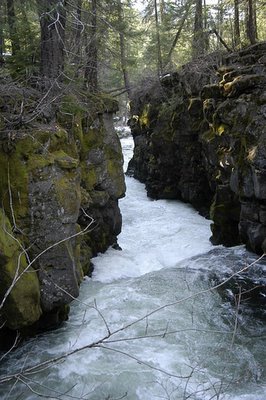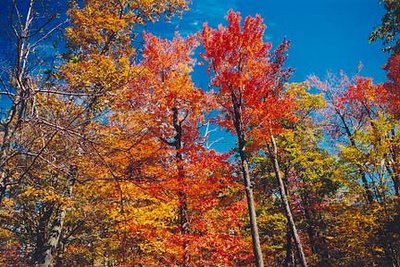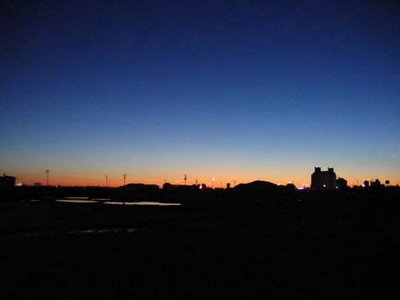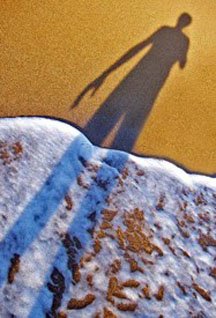River Psalm

According to Carib tradition, the first piai (shaman) was a man who, hearing a song rise out of a stream, dived boldly in and did not come out again until he had encoutered the song of the spirit women and received the implements of his profession from them.
-- Mercea Eliade, Shamanism: Archaic Techniques of Ecstasy
***
THE RIVER BED
Feb. 2-3, 2006
This hour --- 4 a.m., still and dark
and deeply paused -- is like
this day in early February,
a hard heavy-metalled dark
raked by cool winds which
at their high sources could
freeze shamans in their ice-songs
with tusks no pole can bear.
But that is not this end, for
you can see a change stirring
like first buds here, in later sunsets,
those steadily more confident
& winged pinks beating back
a once-regent evernight.
Soon the scent of orange-bloom
will filter through our windows
and then, oh my, a torrent
of spring light and fair days
which tide to roaring summer,
pants down around the
year’s ankles, going full at it
with reddened face ....
But wait ...
This is the hour, and its song
arches back to that
scoured February day
when I walked downtown
Spokane alone -- as usual
alone, endemically,
preternaturally, lunar,
stellarly alone -- And
stood on the river’s bridge
watching a thin trickle
gruel down the center of a
thick gully of black
savaged stone, descending
over the falls’ lip in drips
and gobbets. Call this a
heart? I wondered in
my polar isolation, numbed
and bleak from wintering but
believing anyway all that by
all rights I shouldn’t -- how could I?,
having loved so little? That night
sitting in my chair alone in
the empty house I wardened,
I finished a gout of lines with
this button: “I will not die/Until
I touch another face.” All I
had known and found seemed
but a narrow drone of angels
in a space which seemed
designed for wide-choiring
hosannahs, as if the
falter and frustration of
my days lay framed by a
massive river gorge a wide
and wild as my dreams,
hammered and bruited and grooved
by some mysterious history
I had yet to know, loves
which in glut and dearth
would provoke and curse
and altar. I shut that book
and said goodnight to the
frosted panes which surrounded
me and bedded down with
that missing river. Lost and
swooning in winter’s pitch
I dreamed -- maybe that night,
or one nearby, my memory’s
not exact -- of a woman standing
naked in a river smiling
directly at me, rousing a desire
I had never known so deep
before, hollering an ache
to swim hellbent up through her legs
like a salmon arcing back
against a river which
spring days had loosed.
Thus I met my first love
a week or so later at a party,
our talk like the hum of
waters approaching but not
yet seen. On our first date
we walked rain-misted streets
downtown in an unleashed
thrall, dowsing through our
sentences toward a pounding
we heard everywhere. That
low turbinned thrum got
louder as we neared until,
there standing on the bridge, we
were enveloped in a white
cascading roar voweled
by ten million gallons of
snowmelt heaving down
the falls. I kissed that
woman on the bridge
but trothed my hips
forever to that river,
never more a solitary man
though ever-hence singular
in purpose. There’s a hexagram
for that man on the bridge
reaching for a woman who
would soon leave him forever,
a totem with two faces: The
shadow man seeing only
dearth in late winter
singing magic into trickles,
& the other one riding hellbent
over those falls in a fishlike joy
which ends in losing all,
a smashed whelk resonant
of all collapsing waves.
What I’ve learned is to trust
and seek the bridge which
spines the two together -
not the river in its
empty fulsome alterations
but to sing a span big enough
for all God’s water has to
offer, a smile for every season,
a song to bridge them all.
Between my hips there’s a
river gorge, scored and
scarred by huge waters
which poured now lives ago.
The hour and day and age
of this poem compose
the merest trickle of that swoon,
my wife asleep upstairs,
cat curled on the chair
across from me, window
opened to breezy changes
which foam a coming front.
But I have learned the
prescience of roar and
have through all such harrowings
come to love the quietus
of the worn valley at rest,
nourished, as if by sleep,
by the stillness of a pall
which lends the matin bell
such magic, and opening the
gates a welcome and a joy.
Yes, the stillness is all.
Besides, my tolerance for
gouts has changed -- far less
is needed or will do
to mad the springtime river
in the gallop of these words.
And the trickle that is seen
belies a leaping ecstasy,
dauntless all these years.
Not much has changed in
those essential waterworks
since I last stood on that wild
season’s steely bridge; I’m still
standing there though I am here,
still misted by that crashing blue,
still maddened by the sound of You
sighing backwards into foam,
still reaching where You left
to write the songs which turbine
all great falls, even when
all is still and dark and dead,
even when all sense is fled
and I’m just singing here, or singing along.
I remain to sing the river’s song.

antithesis
1978
you wake me with a smile
I wake up from a smile
a dream dissolving
into sheets and your hair
the sad-eyed woman
standing smiling in the river
in the rivers of your smile
white wet rapids spraying in my ear
calling back my blood
my words drowning in your eyes
washed ashore drunk and empty
I dream sunrise sunset at the ocean
I Ching changes no blame
the light born and dying
your Fiat backing over gravel
backing out into silence
I walk the garden run my fingers
through a grass tuft feel your hair
the sky an ocean rain and tears
the day turning dark and cold
no blame
call it passion call it love
when you smiled
it was all the same
springtime autumn
bedspring tantra
dream within a dream
Great Wheel spinning
a game for fools
demiurge
water bearing light
wordless
I speak of love
all day long your ocean held me
sparkling on a smile
dissolving the page
no blame
***
A GUITAR IS NOT A WOMAN
from “A Breviary of Guitars,” 1999-2000
1.
The present
A guitar is not
a woman
but it’s awful
damned close:
It’s curves are
stolen from the
lucent pool of
Artemis & blown
huge with every
boyman’s ache
for vavavoom:
My heart reels
of a guitar solo
exactly the way
my fingers tremble
when I touch
a woman for the
first time: All
the songs I’ve
ever written
are inked from
the well she
departs down:
chords mortared
in the doors
and deeps of
desire: But it
is stupid and
perilous to
confuse a guitar
with a woman:
I’ve known a
million players
who went to bed
with a woman
and none of ‘em
took their axe
along for the
ride. A woman is
about something
becoming inside
you and a guitar
the difficult amazing
distance you must
travel to
prevent that from
happening: Oh how
long, how difficult,
how important
it is to finally
bloodily accept
this truth:
2.
Spring 1978:
I typed my poems
and papers on
an electric
typewriter using
erasable bond
paper, each draft
supremely more
precious than
the today’s flash
of printouts
so easily erased:
I made far
fewer scribbles
in my journals
too, still unfamiliar
with living long
on the page:
A few lines now
and then
before whoever
I was resumed
whatever I did.
Just think: six
lines of verse
in time
cashing out to
this Breviary:
first cigarette
the haunting music
adrenaline mauls the stomach
why won’t the eyes open
I will not die
until I’ve touched another face.
I read back
over those lines
as if probing
my heart’s DNA:
The pages of
that journal
that captured
the Spring of ‘78
is worn now from
my many returns
to it, in my
many attempts
to learn and write
my story in
so many forms:
A faithful
pilgrim to that nova
that flared soon
after the night
in March when
I went to a party
put on by
some girl at work
and met this
girl named Becky,
a pretty blonde
browneyed doe
who was leaving
for LA in a
week. She was up
from Florida
and didn’t
like winter a bit:
I told her I
was a guitar player
and poet sans
band or book:
that impressed
her nada:
I could have told
her I played
on the Whitworth
College basketball
team or dug
worms in the
park: Becky
preferred her
stuff simple,
not much to
say about it:
simple stuff.
I, who had
walked for years
deep inside and
apart from the
women I yearned for,
was bug-eyed
startled to find
myself so calmly there
beside her simply
chatting, the party
eddying about
us almost
unnoticed: A
A virgin dreams
of what sex
is like so
deeply that
the first time
passes almost
unnoticed: That
was meeting
Becky: She got
to me before I
knew she’d gotten
in: We talked
till one or so
in the morning
until my ride
yawned and said
we had to go:
I don’t remember
if I slept much
that night --
so much happened
so fast in one
week that
I wrote almost
nothing in the
thick of it,
a couple pages
of tortured verse,
hot jots of
amazement
at what erupted:
I think I
got her number
from her friend
and called
her the next day
to make a date:
She said yes,
oh yes:
We met downtown
for lunch on a
raw waking wet
spring day,
temps in the
mid-50s, the Spokane
river muscling
into a roar
with melted
snowpack carried
a dozen miles
down from the
western Spokane
mountains: I
remember Becky’s
brown eyes,
her easy smile,
her southern
voice, and
red-brown shoes
that fastened
with a buckle:
We ate a
restaurant
by the river &
drank a bottle
of wine & told
our life stories
as we could
tell them then,
our heads filling
with a sort
of boozy drowse
that nestled
in the boom
and hiss of
the nearby river:
Where that river
ended and
we began is
the utter mystery
to this day:
We ambled on
through that day
into the the night,
kissing in some
cold wet shelter
in the park where
spring’s raw fuse
burned weirdly
in the cold:
bought more
wine and munchies
and headed back
to my house
to smoke dope
& drink wine
& listen to my
Genesis (sounding
so distant: do
you have any
Journey? she
asked) & on
carrots and peanut
butter: She climbed
on my lap
facing me and
we began to kiss,
my heart pounding
with surprise
and surrender:
After a while
I asked weakly
(almost apologetically)
if she would like
to spend the night
and she just smiled
and led me to
my room by the
hand: We climbed
beneath the covers
n the cold cold
dark of that room,
finding heat
quickly between us
as we wrestled
from our clothes:
I tried to make
love to her
but fear kept
if from happening
at first: We fell
asleep for a
couple hours
and I woke on
her fucking slow
and languid,
the bedsprings
creaking and
squawking
with each dreamy
thrust which
she welcomed,
welcomed:
I came and
drifted off
still in her &
then dreamed
of an incredibly
clear blue space
like a morning
in early summer
by the ocean
in Florida:
Woke with crystalline
waters stretching
miles around that
bed and Becky
sleeping curled
into me like some
blessing I did not
deserve: You
never do: She
woke and we
began it all
again: I kissed
her all over
down to her
cunt which smelled
ripe like armpit
& she was
embarrassed
tried to push
me away but
I butted my
face past her
hand and bathed
my mouth and
face in deep
womanhood which
a day or so ago
was the faintest
constellation
at the furthers
corner of the night:
When she went
home that day
in her yellow
Fiat I wrote
of my surrender
to my birthmark:
O pulse of blood quickened by light
O heart reborn and squinting at the sun
O core bled clean and drying by the pool:
I have held her face beneath my eyes
O love o damnable love. (3/6/78)

HARVEST
2002
I.
During that summer
in Pennsylvania—a
bridge between first
love and long winter—
I scythed a field
behind my father’s house.
The field was ringed
by oak and beech
and maple, puritans
all of wild nature.
Over us the sun
wrote hyperboles
of desire, lathering
us in its swoon.
I loved the motions
of faux harvest,
lifting high that
long blade, carving
off a shank of sun
before sweeping down
in a muscular arc
through shin-high
tapers of weed.
Each return of
the blade seemed
to reach for the
woman I’d lost,
sweeping into the
void she’d driven
off into: But the
blade returned naked
into the bright air
with a long, lonely swish.
Working down the field
I recalled how she smiled
as we stood over the Spokane
River, the spring runoff
pounding chords into mist.
How all that rose to
a hammering release
and then floated
for miles in a drowse.
All lost. I could have made
of that scythe a tillage,
clearing away love’s ruin
to plant something good,
at least useful; maybe
learn something, too.
I was for that hour good
and simple, poised to begin:
But I wasn’t ready to let go
what I’d had lost. I was
too young and stewed
in the sun’s bullish ire.
I mowed that field down
to summer’s end,
set scythe in the barn,
then boarded a train headed
West to find her again.
II.
On a cold autumn night
hedged by the striate
foliage of pot and speed
and booze, I picked up
a guitar and plugged
into a riverish roar.
I loved the weight
of that Fender Strat,
a heftier blade, equine
and amped, cranked to
the berserkeries of love.
What did I know? I was
far afield in foolish ends,
caught in a big night music
which screamed to the
nadir of her. Each swing
of that guitar at song’s
end hauled a sickle moon
down through loud falls
as hard as I could,
arcing back fever-bright
with the ghost of her smile.
Gone, but not lost.
It took me the worst years
to get back to those weeds.
To welcome emptiness
as a field you could scythe.
To celebrate the motions
which complete every kiss,
harvesting what falls
in that long, lonely,
brilliant swish.
RIVER
Spring 1979
down to river full full river
strong river light-laughing river
pounding home home home and
through to other side o river
river we make we make we make
we wake and still wash on through
to other side where she left
o river river first birthday
and standing close only to you
wondering why why why she left
but you just keep on roaring
pounding gushing each moment
ever on and on and on
and the ocean still hides
it hides it hides and yet
I hear its music whispering
winter into roaring spring
o spring o spring o spring
buds burst into song
here today on water's wombday
I'm here in mist and foam
pounding me home o God
I'm breaking loose filling up
spilling over draining out
and lonely lonely so lonely
mad yet full of birdsong
kid cries sun burst
o God I'm coming coming
come to light
and on
to ocean beach and a smile
get up get out know forget know
smile for the kingdom
love the queendom
in ravage of foam
and birth in mist
o lady lady lady lady
lady you are gone but I remain
to sing this river's song

A TRICKLE
from “A Breviary of Guitars,”
1999-2000
Late Winter 1979-80
1.
Lee was the
stockroom boss,
a small muscular
bluecollar man
of 50 who
had spent his years
busting cartons
and getting the
goods for The Man:
He was simple
--almost a doofus--
but he sure worked
hard, leading us
by scything hardest
through all the
day’s tasks: One
day after the
annual inventory
he and Brian and
Linda and I
walked over
to the Trio
and got drunk:
Trading war
stories about work,
laughing, bitching:
Lee got quiet
as we bitched
hot and hotter;
He just kept
pounding those beers:
He had just
buried his younger
brother the
previous week,
so I thought
that was where his
jovial banter
had gone, when
he suddenly
exploded:
I don’t give
A FUCK about
what YOU
think you deserve:
Don’t talk to ME
about money!
Hell I worked for
those assholes
at Grant’s for
FIFTEEN years
for no more
than 250 bills
a week: If you
don’t want to
work at Penny’s
THEN LEAVE!
I don’t care!
The rest of us
sat there stunned,
embarrassed,
and later mad:
He left and the
three of us talked
of quitting, stung
by Lee’s bitter
slap at our
hard work:
Hell we were
just bitching:
But we weren’t
really mad
at Lee because
he was us
with many more
years of busting
ass: A guy who
loved his work
no matter how
much shit tumbled
down from the
fatcat managers:
I saw my future
in Lee and knew
I had better
learn to play
that guitar:
Knew I had
to get away:
2.
On the news
there were tales
of winter madness,
like the snowplow
driver in Chicago
who went amuck
and plowed in 8
cars, the last
one still occupied:
I sat by the
heating grate
with my beer
and cigarettes
with Bach harp
sonatas watching
snowflakes smother
the last of me,
my mind buried
deep: Plowed over:
One night I
dragged some
drunk Mexican
girl home from
the Aquarius who
was itching for
heroin but
took my body
instead there
on the living
room floor
her skin dark
& tough &
scarred her
hips wide
& stretchmarks
on her ass
and her cunt
taking my needle
with huge slurps
and her face
averted in shadow
as she mumbled
swear words and
endearments hugging
me tight and tighter
sucking every
bit of warmth
from my bones:
How do you wake
from night into
winter? How
can there be
light when the
socket keeps
spitting out
cusps of greater
dark? Winter
my woods and
me a weed
for Dion’s scythe:
Sit on that
heat vent, suck
a beer’s marrow
clean, plead
for enough light
to see the next
step, night
after night after
night: Then one day
in early February
it got above
freezing for the
first time in
six weeks: Hardly
a sign of change,
but I felt
a trickle: Some
evidence that
winter does not
follow winter:
My fingers
started to heal
and I could play
for an hour one
day: And still
play the next:
I dreamed of
of walking into
the lake by my
cousins’ house
in Orlando where
I’m greeted by
a great sea snake:
I nearly drown but
then find a footing
to return to shore
but it’s boring there
so I become a bear
and shag back
into the lake to
ask that snake
about a door
somewhere
further below:
The next day
I take my
place on the
heat grate to
write the dream
down & then
try to write
a letter to my
father about winter
and stalled dreams
and madness
but I can’t finish
no matter how
many times
I try: Each attempt
a trickle of
spring that kept
freezing back
over: Who am I,
I ask the slush
outside and
where have
I fallen?
Triple cups
filled with ice
ichor & dream:
Practices with
Dave are vague
and listless,
devoid of course
but we kept
practicing anyway
as winter invisibly
ebbed: But absence
of bitter cold
cannot warm
me where I
had frozen hardest:
not like the warmth
of those dreams
of Florida which
washed me back
ashore each day
gashed deeper
by what I
must return to:
Abuse and spells
unravelling each
day’s center
& returning me
to the heat grate
a shivering child:
Rains come
to melt further
the hard pile against
our apartment:
Finally I
went to a counselor,
unravelling my
untellable spiel
of 3D depression,
dreams, and
dissolution: He
was curious about
the spells but
offered other
wisdom than to
advise me to
stop partying
and to know my
mother: Therapeutic
chicken soup
I hardly sipped
though my heart
was infernally
seeded by angels
flying southward
home: Days in
the bright forties
and people in
the park downtown
jogging & hurling
frisbees & pushing
strollers: Dave
and I on a park
bench playing
the blues (me
on my J45,
Dave on his
harmonicas)
collecting
enough pennies
and nickels
to buy a sixpack:
finding enough
grace in that
small spring day
to find a footing
at the bottom:
3.
the present
Sitting here with
dawn yet far
away and the
window open
to a cool but
never cold breeze,
I look back on
that fell winter
and spring
wondering
how -- or why --
I survived.
Surely the light
was going out:
Drugs were
so easy to find
and I knew how
to do it:
Cocooned in
the terrible
selfishness
of depression
I heard nor
saw much beyond
my dark penumbra:
My sister sent
me a letter
that winter telling
me she dreamed
I had died,
and pled with me
to accept her
Lord Jesus Christ
as my Savior:
I never wrote
back or called:
I recall winters
as those when
I dwindled down
to less than zero:
Winter 78 wasn’t
the last time,
they kept on
marauding in
me even after
I moved to
Florida: two
or three therapists
and a gazillion
AA meetings
and a whole shelf
of psychology books
eventually provided
me with context,
but all their answers
proved moot:
I simply had to
endure those seasons
somehow and cycle
through to spring:
... among these
winters there is
one so endlessly
winter that only
by wintering
through it will
your heart survive
writes Rilke
in his Sonnets:
The energies
were big and I
was young and
stupid: A guitar
is a key to a
blue box filled
with water
heart-blood
sperm and teeth:
Be forever dead
in Eurydice--more
gladly arise into
the seamless life
proclaimed in
your song
Rilke continues:
Here in the
realm of decline,
among momentary
days, be the crystal
cup that shattered
even as it rang:
Tend your key
o so carefully.
Own what you
find inside
no matter how
it terrifies the world:
A ROARr
from “A Breviary of Guitars,”
1999-2000
1.
Spring 1979:
Perhaps what
happened in
early spring 79
was a trial
adjudicated by
Eros or Dionysos
to see if I
was worthy of
Rock’s bitter
blistering
cornucopia:
I believed
-- who in the cups
does not? --
but would I pay?
The Spokane
river by April
a swollen
dangerous
thing as it
hurled the blood
of meltpack
into town,
tumbling over
the falls in
a crash and a
rumble & the
night awash
in spray and mist:
I stood on
a bridge over
those falls feeling
the river inside
a love drowned
down further:
I was cold
and lonely and
more than
half-mad,
scarred with
hoarfrost and
rock dreams:
Flash In the Pan’s
“Walking in the Rain”
is the song
for that season,
swelling synths
and footsteps
on wet pavement
as a voice in
a tube intoned
the passion
of dislocation:
Walking, Walking,
In the Rain:
There I go,
2 a.m. after the
Aquarius had
closed, hugging
my jacket in
the raw spring
night & the
river nearby
surging with
nothing &
my feet the
only way home,
my heart filled
with everything
but the girl
who loves my song;
That music
a lute strung
from river to
my sodden
empty bed,
a sidewalk
glistening with
moon and rain
as all the world
sleeps without me:
2.
Her name was
Laura and she
was just a kid,
a very young 18
to my old 21,
slow witted
but gorgeous:
an innocent take
on the real
thing, big blue doe
eyes blonde hair
and breasts
like melons aching
for the harvest:
Just getting her out
from her house
here she babysat
her siblings
all day was a feat:
We walked in
the park one day
(careful to
show her my river
but she was
afraid to go onto
the bridge -)
Then on to a
fancy dinner: Two
glasses of wine and
she was easy
to steer to the
Sheraton Hotel
by the river
where I peeled
off her clothing
and took utter
delight in her body:
She wasn’t a
virgin, but sure
acted like one:
Had all the
trappings of a
woman except
for the girl
looking at me
through those
big blue eyes,
an innocent
in she-wolf’s
clothing far
too unready
for the likes
of any men,
especially ones
like me who
desperately
settled for
caricatures of
love: Laura
was my river
love-doll that
season and
I blew her up
in earnest:
How easily it
all deflated when
she went back
to her highschool
boyfriend
the next week:
Bereft &
aggrieved I stood
over the river
one night
shouting curses
lost in its larger
snarl: I walked
away believing
that if she lived,
my love had
surely washed
south: I called
my mother in
Florida and told
her I was taking
a bus home:
Quit my job
at Penney’s the
next day and
walked the late
afternoon
feeling stunned
and feral
and ready,
a changeling
in dirty jeans:
Bought a copy
of Burrough’s
Naked Lunch
for the long
long ride: Told
Dave that night
that it was time
we woke up from
our hopeless
dream of rock and
roll: I packed
one suitcase and
pitched the remaining
detritus of life:
guitar picks
and cannibis stems
and empty bottles
of beer: Some
Girls on the
stereo outside
a sun never warm
enough
now shattering
the sky: Blue blue
heaven calling
me south:
3.
Or so I thought:
I didn’t go:
Half an hour
before the bus
departed I knew
it was too soon
in the song
to go solo:
Torn loose
from my job,
quit of all
musical inspirations,
readying to head
home to mother
just like the
doctor prescribed,
skinny and
loveless and needy:
these were the
motions of my
wintered heart
and but at
that last moment
I saw that spring
had come to
Spokane, not
with the salvation
of love but the
true power of
the river:
Not to baptize
my mad loveless
soul but to
provide a
pagan rhythm,
a backbeat,
a lavish gradient
for song: A
river is a
guitar strung
with the blood
of Olympus:
And so I
remained to
sing the river’s
song: That night
Dave and I
went out to
the Black Dog
at State Line
Idaho to
celebrate
our reconvened
future: Hot
Stuff onstage
playing the
best rocknroll
around with
a killer PA
and the Pierogue
brothers with
just the right look
roostering Rod
Stewart and
the Stones
and that new band
Van Halen: Dave and
I pounded Scotch
& ate crosstops
& danced like
satyrs, like fiends,
like wolves: Some
cowgirl took me
home with her
way out in
Buttfuck Idaho
to a trailer she
shared with
her kid & folks,
riding me
savagely behind
a bedsheet
hung for a curtain,
a huge bang of
hair hiding
her eyes: She
the drunken
mediatrix of my
return, for good
and ill: The next
day she drove me
back to Spokane
through miles
of scrub and wild,
spring blasting in
through rolled down
windows, Pan’s
balls bouncing
in my startled
fresh heart:
Back home I
plugged my
MusicMan into
the stack and
began to rip
it up anew, the
music feeling
somehow different,
now a bladed,
whirling thing,
slashing madly
through bellowing
buds: Bereft
now of all
but song, only
the song mattered
and then in
an offhand,
rock-sassy way:
I was at last
dancing to my
music in
the wasteland:
walking, walking
in the drain:
and the song
was good
though I no
longer was:

RIVER PSALM
2004
o lady lady lady lady
lady you are gone
but I remain
to sing this river’s song
I wrote that in spring
1979, rivering words
on paper the awesome
gout I had felt earlier
in the day when I retraced
my steps back to
that bridge on which,
one year earlier,
I kissed my first
passionate love
while the Spokane
river pounded hard
below. Now wounded,
harrowed, and barely thawed
from a bad winter
in which her absence
froze me in ways
as deep and majestical
as the depths she
first opened in me
with a kiss -- One year’s
bad harrow from that
birthing bliss, I
had walked downtown
on sidewalks finally
bare of snow and ice
and walked out, alone,
over that frightening
foment -- of the river,
at least, ferrying
the melted icepack
from the mountains
west toward the sea.
Today I’m not sure
what gripped me more,
the river scene
I had returned to,
expecting to find
her on that bridge,
or the way in which
the words cascaded
from pen to paper
in full memory
of what passion’s
crashing billowing
cruelly descending
knife fully felt like.
I stood on that bridge
that day -- in flesh
and on paper --
enveloped in the
roar and the mist,
the steel track
shaking and trembling
from the naked pound
of that huge water’s
roll and pour and
smash to falls below.
That sound -- in
the river and in
my ear -- nailed
something angelic
to the hands spread
in my heart, hands
which once had
squeezed her breasts,
hand which on
that anniversary
and now I spread
wide in bittersweet
full welcome.
The scene was both
pregnant and bereft
of her when I got
home and wrote that
poem, my very
verbal sense trying
to cup her in that
bridge-span’s vigil.
As if words for a river
on a mighty day in
spring long after
she had left me
returned that shapely
ass to my hands,
the poem’s motion
her own rocking
on my hips,
my words distilled
from all the
ones she once
(and only once)
mouthed in the
psalms of high pleasure,
naming every fish
and glade in all
the seas below.
Ah, to recall that
sweet madness
in a river’s spasm
of a poem! To have
the fullness of her
absent that real
woman who gripped
down as I spasmed
and railed jots
of motlen sperm in
her: To hold high
that flood of light
in the collapse which
all falls and lovers
share as they
merge and so
dreamily drowse
on down to the sea:
Such was my feeling
then on paper
that even today
I know like my
own hands the
gauge and length
of every steel nail
the moment hammered
through my palms,
shrieking words
which pierced through
skin and tendon
and splintering bone
in an ecstasy of
pain and blood,
fastening me forever
to the soul-wood
of that day. How
could she be there in
every way that
dishevelled, half-lunatic,
badly hungover
March afternoon,
fully resonant in
the river’s rapture
and pouring bliss
—And yet be gone,
never to be held again?
That poem “River” was
the cry upon my lips
that day when one
faith dies and
another sprang to life,
freed from God and
godly women to build
a chapel by that scree,
a tide of lines which
keep old flames alive
in waters dark and fresh
and wild. The river’s
song is where her
single kiss, that raging
water, and your
strange dominion
in my history
all merge and sigh
in mint-fresh malt
and salt confusion.
See: words
are pouring from
my mouth as hot
as those molt
angels I unfurled
deep into my first
love one hungover
morning half a lifetime
ago, giving her
the wings to go.
Each word here’s
a stallion of that
stampede; this poem
is a mash of
those blue hooves
galloping wild over
the falls. And you
are there beyond
where all water
flows on, down and
in and deep, astride the
torrent of one
man’s river ache
to bed in your
deepest womb
& stare in your
eyes at last
your every body
clenched fast to mine.

BEGINNINGS
2003
Day, season, year -
each begins
from this bland
dark which neither
rises nor enfolds
not yet - but
pauses blinking
on the shore
among the skulls
of battened fish
& marvel at
white sands so
pale in late
moonlight and
the loins of surf
now drawing back
so slowly, like
an aftebirth -
Day, season, year
all begin as
an eye waking
sowly to the
next blue homeland
where all is harrowed
by those waters
which recede, a
caul of combed
abyss leaving
a pale gleam in your
eyes as you
gaze into the
waking day,
year, life. Be
grateful for
such parentage
& sire sure
motions of that
first bliss with
a gentle, oh
so loving kiss
as you vanish
down the deep
lanes of slowly
rising, softly
enfolding mist.


















